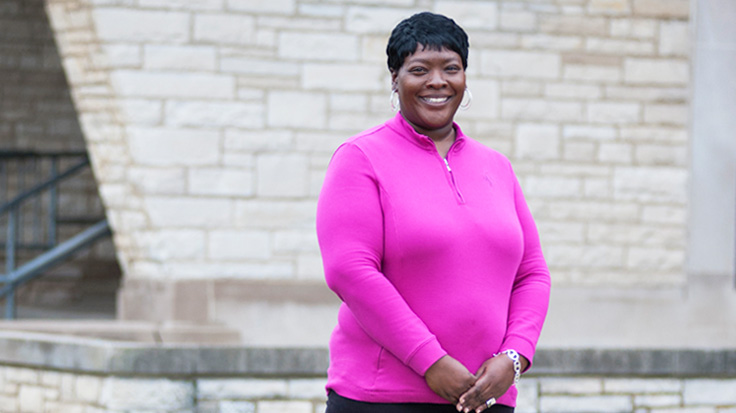
Della tried many diets, exercise classes and ways of preparing foods. She’d stick with them for a while, then return to old habits. She had two more children and lost weight following each pregnancy, but always gained it back.
“I took great care of my kids, making sure they went to their doctors’ appointments, but didn’t take care of myself. When I finally went for a checkup, I weighed 297 pounds,” she says.
For 10 years, Della considered having bariatric surgery, but she was afraid. Following the birth of her son, she had a tubal ligation and recovered without taking pain medication. A resulting awareness of her strength, combined with chronic knee pain and getting winded from walking up stairs, gave her the incentive to take action.
“My first appointment was with a nutritionist, but I also met Dr. Bencsath. Everyone at Twinsburg, from the receptionist to the nurses and doctors, was great. I knew this is where I wanted to be.”
“Last summer, I saw a commercial about bariatric surgery at Cleveland Clinic, and immediately went online to complete the questionnaire,” says Della. Following an initial consultation at the Bariatric and Metabolic Institute at Cleveland Clinic main campus (where she weighed in at 348 pounds), Della committed to moving forward, and asked about program options closer to home. She lives in Maple Heights, but often goes shopping in Twinsburg, so began the process of completing the required dietary, nutrition and psychotherapy evaluations at Cleveland Clinic’s Twinsburg Family Health Center.
“My first appointment was with a nutritionist, but I also met Dr. Bencsath. Everyone at Twinsburg, from the receptionist to the nurses and doctors, was great. I knew this is where I wanted to be.” “Della’s condition was similar to that of the one-third of all American adults who are obese or morbidly obese. She was more than 100 pounds overweight, had elevated blood sugar levels and a family history of diabetes, and was unable to maintain a healthy weight with diet and exercise. These things made her an ideal candidate for surgery,” says Kalman Bencsath, MD, general surgeon and lead bariatric surgeon for Della’s operation at Hillcrest Hospital.
Over the course of a few months, Della met with a nutritionist and began changing her diet and exercise habits in preparation for life after surgery. On Nov. 17, 2014, with her weight loss already started, 39-year-old Della was the first bariatric surgery patient at Hillcrest Hospital.
According to Walter Cha, MD, a general and bariatric surgeon at Hillcrest Hospital who provided surgical support to Dr. Bencsath during Della’s procedure, the most common bariatric procedure is gastric bypass surgery (or Rouxen-Y). This procedure creates a small stomach pouch, bypassing the lower stomach, so less food can be consumed. Over the last few years, sleeve gastrectomy has been growing in popularity. In this procedure, stomach capacity is reduced by stapling the stomach and removing two-thirds of the outer portion.
“Deciding which type of bariatric surgery is best for an individual is a journey the surgeon and patient take together,” says Dr. Bencsath. “In Della’s case, based upon her goals and lifestyle, we agreed the best option for her was a sleeve gastrectomy.”
Della spent two days in the hospital, and within two weeks was back to her normal activities. She is right on track in terms of weight-loss expectations, having lost 100 pounds since she started the program. An instructional assistant at a local school, she also coaches volleyball, basketball and track teams.
According to Della, the worst part of this journey was the years leading up to her surgery, when she wasn’t being honest with herself about her weight. The best part? “I compare the process to having a baby. The labor pains are terrible, but you forget all about them once you have that bundle of joy in your arms. A week after my surgery, I felt the same way. The fun part began — I can now play with my own kids and keep up with the kids I coach!” she says.
Related Institutes: Digestive Disease & Surgery Institute

